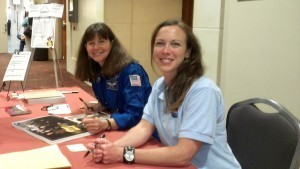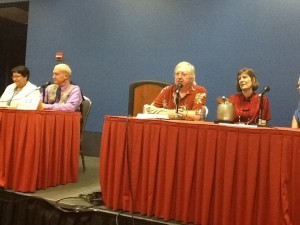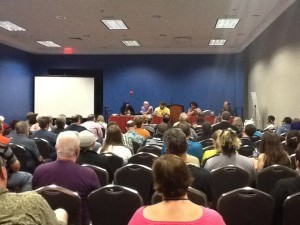Patrice Sarath's Blog, page 21
November 2, 2013
WFC panel roundup
Yesterday’s WFC panels have sort of blurred into today’s panels without me noticing. I blame the distractions of the convention itself and perhaps a smidge of beer.
Some highlights: The Broads with Swords panel, ably moderated by Laura Ann Gilman, and featuring Robin Hobb, Juliet E McKenna, Gaie Seibold, and Trudi Canavan, was a wild and woolly panel of influences and references to the best in fantasy. It is a truth universally acknowledged by anyone with half a brain that women can write dark and nasty stuff equal to any male author. Also, a fair majority of them come from Australia.
On Saturday I went to the Richard Matheson tribute by his son Richard Christian Matheson. He showed a video interview with his father and answered questions afterwards. What a phen0menal career, and such an influential author.
RCM also appeared on an excellent panel about selling spec scripts. This was full of great advice, and because writers are eminently quotable, here are a few gems:
“What else have you got?” Sometimes this occurs one sentence into your pitch. That’s a bad sign. But “What else have you got?” occurring later means they may be interested in you as a writer with a career.
Spec scripts are best for showing agents what you can do, but not necessarily for selling that particular script.
Everyone is nice in meetings. It’s LA! “The meeting always goes well. But no one is going to be an asshole in the room.”
On the screenplay being changed during production:
“You have to be prepared for the script you love to sleep with other people.” Peter Atkins.
The other delight was the agent panel with a veritable powerhouse of panelists. The upshot — agents can do a lot for you. Especially in this era of self-publishing an agent may be more necessary than ever.
Lunch was at a Lebanese restaurant down the street from the hotel with various members of the T Party (no, not that Tea Party). I’m heading back in in a few minutes. So much to do, so little time.
The post WFC panel roundup appeared first on Author Patrice Sarath.
October 31, 2013
WFC Day One

A view from the room at Brighton.
A fantasy writer walks into a bar…
Talks with Juliet E McKenna.
Visits with Gaie Seibold.
Says hi to Charles Stross.
Gives John Picacio a hug.
The convention is just gearing up. I have a reading on Saturday and I’m looking forward to some excellent panels, including the unfortunately named Broads with Swords. It is sure to be excellent fun and wholly informative.
In other news, the barbecue at Smokey’s in Brighton needs to work on its brisket. Listen, all you haters, just because they’re English doesn’t mean they can’t give it the old college try. And we ate there because we had to give it a try. It was like a challenge. But yeah, it’s about what you expected.
The post WFC Day One appeared first on Author Patrice Sarath.
October 27, 2013
3 Stories, or Gordath Wood is grumpy
The Asimov’s Double Issue Oct./Nov is a thick digest of science fiction goodness, so the fact that I’m focusing on three stories that are telling the same story — the destructive, betraying nature of women and the stalwart male who must resist this betrayal — is, I admit, a bit ungracious.
But still, really? We’re still telling this same story? I just expect better of science fiction writers.
Jack Dann’s Waiting for Medusa is notated Homage a Harlan, and it shows. The male dog-creature sentient intelligent main character is betrayed by the soft female woman who has been sent to make the dog fall under her telepathic empathic spell to bring him in to vivisect him for his ability to regenerate.
Paul Di Filippo’s story, Adventures in Cognitive Homogamy: A Love Story, is about a man who is betrayed by the babymaking desires of his fiancee and the raw sexuality of a woman who tricks him into being a fall guy for a scheme. The setup — highly intelligent woman who is all celebral calculation vs. the sexy Latina of the underclass — is eye-rolling. However, the story is working on so many levels — this is a Di Filippo story, after all — that it almost makes up for this characterization. However however, Di Filippo is so good, that this is all the lazier for it. Would it have killed you to take a step and dig a little deeper?
No Others are Genuine by Gregory Frost is more fantasy than science fiction. A ten year old boy is betrayed by his widowed mother’s interest in a nefarious stranger who has already caused the disappearance of the young woman the boy has a crush on. There are a couple of insulting portrayals here. One, is that women need ten-year-olds to protect them. Two, that as always, a woman who acts on her sexual interest must be punished (the good mother, still young, is punished because she is attracted to the bad guy). The boy acts because of the death of his crush, so this story is a form of fridging.
So why are we still telling these stories? There were several others in this double issue that didn’t fall into these caricatures, these tired, tiresome views of women. Why in the service of story teling — classical in the case of Frost, more avant garde in the Di Filippo and Dann — does the stereotypical portrayal of women continue to be perpetrated?
The post 3 Stories, or Gordath Wood is grumpy appeared first on Author Patrice Sarath.
October 20, 2013
NaNoWriMo 2013
If it’s October that means that it’s time for the annual NaNoWriMo post. In a nutshell, here is my approach to the event that consumes the writing community for the wacky month of November:
Don’t do it.
To recap: in 2009, I wrote a post entitled, Writing a Novel? Don’t Do NaNoWriMo.
Writing requires steady, consistent effort. Blasting through a novel at over 1000 words a day means that you will get a lot of crap and at the end of the experiment you will have 50,000 words, far too short for any market today.
You can read the rest at the link. Definitely read the comments. They’re the best part of the post.
I waded into the controversy again in 2010 (still more thoughtful commentary), and later the first post was picked up by TIME in 2012.
My stance has softened over the years. I still think that NaNoWriMo devalues the writing experience. It certainly devalues editing, if the number of raw manuscripts that cross agent and editor desks in December are any indication. However, plenty of writers use NaNoWriMo as a big celebratory jumping off point for a writing burst, and they know about editing and polishing.
So if you are facing NaNoWriMo for the first time, I still think you shouldn’t do it. But if you do, here’s the way to “win” at NaNoWriMo:
Turn off the internal (or infernal) editor.
Get the words down.
Don’t worry about making daily word count; but do work steadily each day.
When you reach November 30, and you have around 20,000-50,000 words, take a deep breath and realize that what you have isn’t a novel.
It’s a good start.
Even if you reach 50,000 words, that’s far too short for a standard novel in today’s world of publishing. This has changed with self-publishing and e-books of course, but in general, 50,000 words is less than novel length. So you will have to write more, and then you have to edit and polish and rework, draft after draft. You might have to cut some of those 50,000 words and add others that are the right words.
And when you reach The End on the first draft, remember: The End is just the beginning.
So Don’t Do NaNoWriMo.
But if you do, use it to jumpstart your writing, not as a sprint but as a a marathon.
Good luck!
The post NaNoWriMo 2013 appeared first on Author Patrice Sarath.
October 4, 2013
How my muse talks to me

When we answer our muse, we don’t know where she will take us.
How my muse gets my attention:
The Uncommitted Come-on
“There might maybe sorta kinda be a story in that little bit of an idea right there. You could maybe see it if you look at it sideways. Just saying. No? Okay, I was wrong. Never mind.”
The Vague Restlessness
“Sit down and write. You don’t know what to write? Okay, get some tea. Brush your hair. You still feel like you need to write? Maybe it will come if you eat that chocolate. Mmmmm, chocolate — where were we? Oh yeah, did you want to write something? I dunno, sleep on it. Something will come.”
The Snide Passive-Aggressiveness
“Oh, so now you want to write? I thought you didn’t want to write, because of the chocolate and the tea yesterday. You didn’t seem very interested yesterday. But now you’re ready for an idea? Okay, it’s all right. I can drop the other stuff I had planned and come up with an idea. Not a problem. I just thought you didn’t want to write, is all.”
The Inconvenient Whisper
“I know you’re working on SWOT analysis of the financial services industry that’s due by the end of the day, but I think you want to listen to this. Yeah, we got your plot, characters, setting, motivation, and pacing all in the starting gate, and” — drops voice — “I’m not sure how much longer I can hold them.
The Sharp Thump
“Hey. Yeah, I just thumped your head like it was a ripe watermelon. So sit down, get through the writing ritual, and get started.”
The Lapel Grab
“Holy Mother of God, start channeling RIGHT FREAKING NOW and don’t stop until I let you go! Go go go go!”
How does your muse talk to you?
The post How my muse talks to me appeared first on Author Patrice Sarath.
September 24, 2013
Goals and aspirations

Keeping readers up past their bedtime since 2008.
A conversation on Sunday with a couple of writer friends over brunch led me to think about my goals and aspirations. One author said that his goal was to sell a few books and entertain people. He was not as interested in awards or writing the kinds of books that win awards; too lit’ry, he opined.
What do I want? I want to write books that entertain people AND win awards. I want a rocketship, dammit! I want critical acclaim and popular sales, and knowing that I tell a good story that people want to read and come back for more.
I don’t think they are mutually exclusive — hell, take a look at Neil Gaiman and Terry Pratchett. I don’t think that critical acclaim has sapped their entertainment value.
To get there, it’s not enough to write what sells. It means aspiring to write the stories that move me, and bump my writing up to the next level. In my case, all the things I find the most difficult — plot and pacing — have to come to the forefront. I have to keep working on those skills. I know I’m getting there as I’ve had fans tell me I’ve kept them up too late reading just another chapter. **evil grin **
I guess this is my version of Mary Chapin Carpenter‘s song Passionate Kisses:
Is it too much to demand?
I want a full house and a rock and roll band
Pens that won’t run out of ink
And cool quiet and time to think
Shouldn’t I have this
Shouldn’t I have this
Shouldn’t I have all of this, and
Passionate kisses from you.
Really, it’s not too much to ask, is it?
So — that’s what I’m working toward. I think it’s a worthy cause. Always write up, my friends! Never let good enough be good enough.
~
*We feasted on smoked salmon and ham, spinach and mushroom omelets, Irish soda bread, fruit salad, fudge (because why not?) and coffee. Writers know how to live
The post Goals and aspirations appeared first on Author Patrice Sarath.
September 16, 2013
Why we buy
Note: This blog post from August just up and disappeared; Luckily, I was able to recreate it because my blog also posts to my Goodreads page. If someone could tell me why WordPress does that, because this has happened to me before, I’d love to hear it.
Note the second: And at this point I read the anthology and truly enjoyed the poem that kicked off this journey and the rest of the stories.
I just bought a book. This is hardly unusual, but I thought it was interesting to tell you how I came to decide to purchase the book within all of 15 minutes from start to finish because it shows a confluence of factors that help book sales.
Why we buy is as important as what we buy, and these decisions are so emotional as to be inexplicable. I’ll try to explicate it anyway.
The discovery
On July 31, Apex Publications posted on its blog, Bag of Holding: Top 5 Necessities for Con Survival, a timely article because WorldCon is coming up.
I read it, liked it, and shared it on my Gordath Wood Facebook page. One of the authors profiled in the post is LaShawn M. Wanak, an author I hadn’t heard of before. And this is where emotion kicks in. I liked what she had to say about cons and what to bring (I’m a sucker for snappy and self-deprecating, plus Totoro badgeholder, and where can I get one?).
The decision
Then I followed an Apex link to a fragment of her poem “All this pure light leaking in,” which was published in their anthology, Dark Faith: Invocations, and I wanted — needed — to read the rest.
I followed the buy links and the book is waiting on my Kindle for me.
If it’s shelf-worthy, I may do what I tend to do, which is buy it in paperback so I can get it signed. (Yes, I’m that kind of book buyer. Would that there were more of us.)
Why it was easy
Even though I’ve been telling myself to hold off on book purchases, since I am going to the biggest science fiction convention in the world in a few weeks, I still bought. Here’s why:
I like Apex — they bought one of my short stories years ago — and they have a good reputation. So I already knew I was going to be in good hands.
The price was right. We don’t like to think about it, but it’s true — we’ve been conditioned by the downward pressure on pricing to buy only at certain price points. Apex hit the sweet spot with its e-book pricing.
I really wanted to read the rest of the poem, and the table of contents convinced me that I wouldn’t be disappointed with the rest of the anthology.
So there you have it — the anatomy of a purchase.
What we write has to hit someone at an emotional level. Then they have to find it. Then they have to be ready to buy, so we have to make it easy to do so. That moment used to be in a physical bookstore, where people could browse to their heart’s content. Now the browsing is online.
The conversation
Many times authors feel that it’s like shouting into a wind tunnel to promote their work. And a lot of times it is futile. There’s a lot of noise out there, and getting your signal out to rise above it contributes to someone else’s noise.
But sometimes the signal does get through, loud and clear. And then our readers buy. I am convinced that it’s just as important to try to have a conversation as well as an efficient marketing presence to help readers find us, meet us, and when they are ready to try our books, to put it in their hands at the right moment. I’m still working on that with my web presence. Apex shows how it can be done.
The post Why we buy appeared first on Author Patrice Sarath.
September 10, 2013
WorldCon — the NASA track

Astronaut Cady Coleman and NASA Engineer Heather Paul at WorldCon.
It might have been the best kept secret of WorldCon. There was an entire track about NASA, the astronaut missions, working in aerospace, asteroid detection, and more. I didn’t get a chance to see as much as I would have liked, of course.
Shuttle and Science
Astronaut Cady Coleman gave a talk on her missions and showed video of everyday life on the International Space Station. She also spoke on another panel about women in aerospace, in which several women who worked for NASA discussed the barriers and also the lack of barriers to a career in STEM.
What I came away with was that sometimes we look for barriers where there are none. Now that nothing keeps women from entering college and studying the subjects of their own choosing, there might be individuals who are obnoxious, but when everyone is focusing on the same mission, the jerks who are playing the gender game fall by the wayside.
Sexism: Don’t let it stop you
Coleman was circumspect in talking about one Russian astronaut who gave her a hard time on one shuttle mission. Yes, he had a problem with women in the space program. She often had to communicate with him through a male colleague. But as she pointed out, when you are where you want to be, doing important work, you don’t let that stop you. She also told us that he was so unpleasant with his male colleagues too, that the joke was he flew with foreign astronauts because the other Russians didn’t want him. So hah! Russian dude who is still in the 19th century. Take that.
One of Coleman’s jobs on the shuttle was capturing supply ships with the robotic arm. She and another astronaut were the only two people who had the job; both women, in fact. She said that for a while there it was starting to look like only women could do it, until obviously people came to their senses and let a male astronaut try. For goodness sake’s, it’s not like they’re incapable or something. (See what I did there?)
There and Back Again
She was all for the space mission’s partnership with commercial companies (note; not the same as the civilian contractors that have always been highly involved in building the shuttle and rockets). Commercial companies can move faster and make decisions faster. However, before developing missions to Mars, there’s still plenty of testing and science that has to be done. There are environmental issues at least once a week on the shuttle. New ships will have to be much more robust.
The science done on the shuttle included crystal growth for drug development, osteoporosis experiments (she suffered a great deal of bone loss, but the effects were not permanent in large part due to the amount of load-bearing exercise she did while in space.) Preventing bone loss is going to be a significant part of a successful mission to Mars, she said; otherwise you will have “spaghetti people” going to Mars and not being able to open the door when they get there.
Stopping Asteroids
Paul Abell talked about asteroid detection. He called it NASA’s “grand challenge.” How do you protect the planet against asteroids, especially the kind that can, as he put it, “give us a really bad day”? You have to find them far enough out that you can make minor adjustments to their trajectory to push them out of the way. And then you have to re-calculate to make sure they stay out of the way. The panel talked about gravitational tractors, the nuclear option, even the gentler method of painting the rock white, changing the temperature, and altering its direction that way.
Thanks so much to all of the scientists who contributed to WorldCon.
There was a lot of talk about the Chelyabinsk asteroid, and why no one detected it until it detonated over the city. The rock came from the direction of the sun, and therefore it was impossible to see. Clearly this is a blind spot that needs to be fixed before we can prevent a worse disaster.
The post WorldCon — the NASA track appeared first on Author Patrice Sarath.
September 3, 2013
WorldCon quote-a-thon
Best lines of the 2013 WorldCon in San Antonio. Bonus if you can match the speaker to the quote.
“I for one want a thorough pressure check before I open a door.”
“Any sufficiently reliable magic becomes technology.”
“Honey, it’s like the convention of misfit toys.”
“And then I woke up and I was hosting the Hugos.”
“Great Norman Spinrad on a scooter!”
“It looks like The Last Supper up there!”
“If I had known all I had to do to get one of these was to quit the job and not show up at the ceremony, I would have done it a lot sooner.”
“This is a nice stage. I like this stage.”
“Do you know why I’m a better writer than you? I have more fillings.”
Other contributions:
“Wait…Wait…Wait…Wait…Wait…Wait…Wait…Wait…Wait…Wait…Wait…Wait…Wait…Wait…Wait…Wait…Wait…” (thanks to Lawrence Person)
“Speaker 1: We met [author's name redacted] for lunch and decided to form a cabal. Speaker 2: that sounds like a fine idea. Speaker 1: it was, until [publisher's name redacted] started to tell everyone about it. [Publisher's name redacted]: I can tell who I want, it was my idea. Speaker 1: no you can’t. Speaker 2: Isn’t the point of a cabal that its membership is supposed to be secret? Speaker 1: yes, which is why we now have to take out [publisher's name redacted]. hey want to be part of our cabal? We’re soon going to be short one person. Speaker 2: absolutely. And unlike [publisher's name redacted] I know how to keep a secret.” (Courtesy of Renee Babcock)
“Don’t witness to the cops!” (from Adrian Simmons)
“Uggh…he got penis metaphor all over this microphone!” (overheard, contributor wishes to remain anonymous)
“I never eat those screen-printed cakes. Tooth stains.” (from Adrian again)
Feel free to add your own in the comments.
The post WorldCon quote-a-thon appeared first on Author Patrice Sarath.
August 31, 2013
WorldCon pics

Willy, LE Modesitt, Sharon Shinn and others on Geography of fantasy.

What a crowd! Stina Leicht runs the Sword&Sorcery panel.
The post WorldCon pics appeared first on Author Patrice Sarath.



